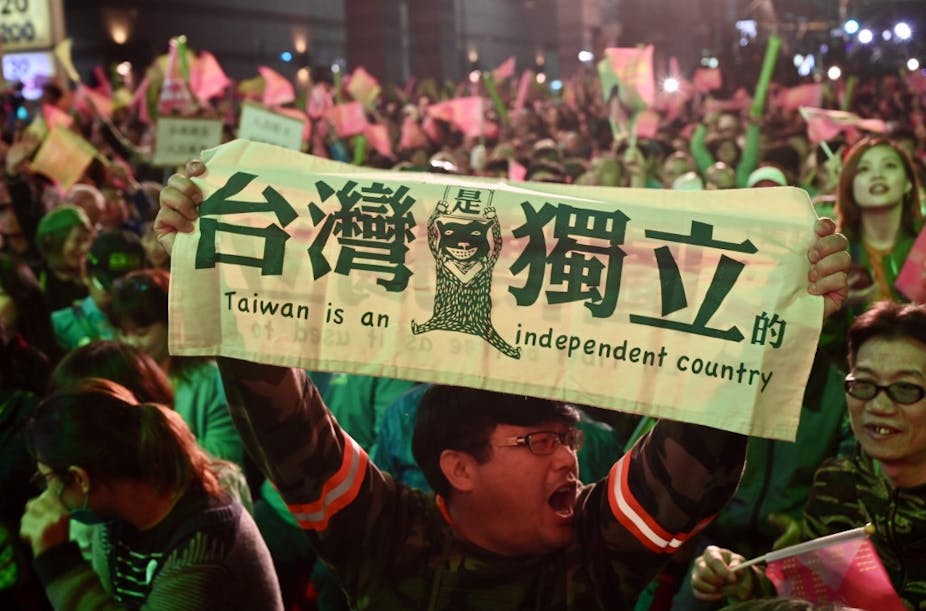As the China specialist Stéphane Corcuff recently reminded us, Beijing’s assistance to countries affected by the Covid-19 pandemic could be seen as an application of one of the classic “36 Stratagems”, “make a sound in the east, then strike in the west” – taking advantage of when an opponent is distracted and least expects it.
The island nation of Taiwan has been a big stone in the shoe of Chinese authorities, and they consider it to be one of the “five poisons”“ – the others being the Uyghur independence movement, the Tibetan independence movement, Falun Gong adherents and Chinese pro-democracy activists.
Repeated Chinese military incursions
Since 1949, an unspoken rule has kept the two countries’ military and civilian aircraft from crossing the centre line of the Taiwan Strait. However, the rise of the People’s Republic of China has been accompanied by an assertion of its sovereignty, particularly in the South China Sea.
In the midst of the Covid-19 crisis in East Asia, a Chinese Xian H-6 bomber and its escort planes made two incursions into Taiwan’s airspace, first on February 11 and again on February 28. In response to both incursions, the Taiwan Air Force intercepted the Chinese aircraft with F-16 fighters.
The events were just the latest in the long list of air and naval movements carried out by the PRC around the island over the last two decades – they’re a way for Beijing to intimidate Taiwan, evaluate its own capabilities and test the United States. In the summer of 2019, Washington approved the sale of 66 F-16s to Taiwan. In accordance with the Taiwan Relations Act, in force since 1979, the island benefits from American equipment and know-how, but has lost military superiority over Beijing.
In China’s long-term strategic vision, regaining control over Taiwan would give provide a discreet exit for its submarines – the South China Sea is not deep enough and too "closed” by the narrow straits. In a speech at the beginning of 2019, Xi Jinping evoked the possibility of military intervention should Taiwan declare independence, and the increased militarisation of China’s actions contrasts sharply with official discourse on connectivity and international trade.
A “bastion of freedom”
In 20 years of aggressive diplomacy by China around the world, the number of states recognising Taiwan has fallen from more than 30 to just 15, yet despite its diplomatic isolation, Beijing’s repeated interference has breathed new life into the island. The situation in Hong Kong since May-June 2019 galvanised the Taiwanese electorate last January around outgoing President Tsai Ing-wen.
The re-elected president’s speech emphasised the island’s sovereignty and democracy, making Taiwan a “bastion of freedom” in the Indo-Pacific. The election reveals to the Chinese and the rest of the world that Beijing’s “one country, two systems” model does not appeal to Taiwan’s citizens. This model has shown its limits in the situation of Hong Kong, whose situation is seen unfavourably by a majority of Taiwanese.
The Taiwanese model in the Covid-19 pandemic
On March 13, the New York Times published an article detailing how Taiwan, Hong Kong, and Singapore contained the coronavirus pandemic without resorting to China’s drastic measures. In particular, the countries acted quickly from the beginning of January, tightening border controls and closing flights with China. They also began closely tracing patients and their contacts and also enacted a strict quarantine for ill and contaminated persons.
In Taiwan, four months after the detection of the first cases in China, the preventive actions seem to have paid off. Despite a slight rise in the number of cases, the island is one of the least affected regions of the planet.
Despite Taiwan’s success, the World Health Organization (WHO) and the Organization of International Civil Aviation (ICAO) have been limited in their praise for Taiwan, presumably so as not to upset Beijing.
On February 3, WHO General Director Tedros A. Ghebreyesus stated that “restrictions on air flights were useless”. Eight days later, Fang Liu, Director of ICAO, recommended that the flight restrictions be relaxed, even though American carriers had just suspended their flights to China. China had pressured the WHO not to declare that the coronavirus was a pandemic, and the result was denial and delay.
The absence of Taiwan within these international organisations should force us to reconsider not only their mode of operation but also the need to rebalance foreign-policy choices. Four out of the fifteen international organisations associated with the UN are headed by directors installed by Beijing, and China would not be displeased to see that number increase.
China claims that its authoritarian governance was the key to allowing it to stem the coronavirus epidemic, yet Taiwan shows that democratic nations can provide a response that is just as effective, if not more so. The Covid-19 crisis is a reminder that Taiwan should cease to a diplomatic blind spot for the United States and EU. A bad sign for the free world that should be repaired.


